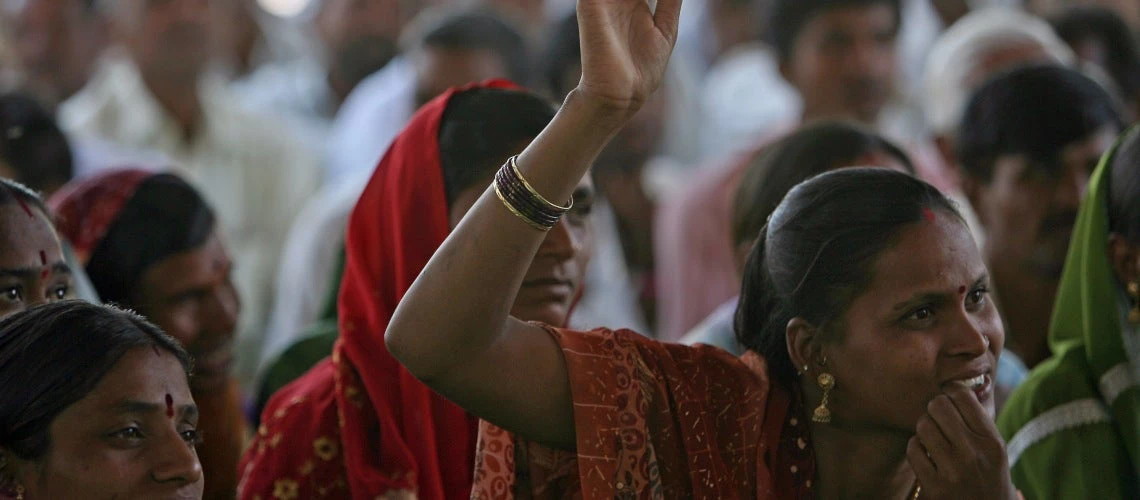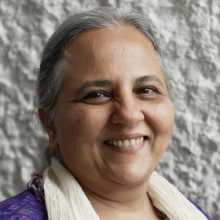 A grassroot organization in India is leveraging member-generated data to change the lives and livelihoods of women, one data point at a time. Copyright: Simone D. McCourtie / World Bank
A grassroot organization in India is leveraging member-generated data to change the lives and livelihoods of women, one data point at a time. Copyright: Simone D. McCourtie / World Bank
About six months after Kantaben lost her husband to COVID-19, members of the Self-Employed Women’s Association (SEWA) —a national trade union of 2.5 million informal workers in India—approached Kantaben about renewing her annual union membership. Their database showed that the number of people in her household had dropped. Acting on this information, SEWA helped link Kantaben to a government pension scheme for widows. “They also helped me file the life insurance claim for my husband. In one week, my financial woes were sorted,” Kantaben said.
The story of Kantaben resonates with many poor women workers from the informal economy in India. Informal women workers are often overlooked when it comes to government schemes and benefits. As Kantaben’s experience illustrates, better gender data can help.
Shifting to new sources of gender data
Gender data is an umbrella term for data that are disaggregated by sex and meet additional requirements to ensure that data captures relevant gender differences in thematic coverage, methodology, and data collection approaches. Gender data can help governments understand the advancements and setbacks in women’s lives and inform the design and monitoring of policies and programs to accelerate gender equality.
The rapid digitization of the economy offers new opportunities to generate gender data: think about transactional data from private sector services, crowdsourcing data from mobile phones and internet, satellite data, or citizen-generated data. These data sources hold great promises due to their continuous and frequent collection, high levels of granularity and intersectionality, and potential to cover perceptions.
Digital data in the hands of its users
SEWA provides a great example of the power of citizen-generated digital data. Understanding the importance of gender data, SEWA started digitizing and structuring its membership data in 2011. Today, over 2,000 grassroots leaders use a customized membership management app to collect and renew the membership data of 2.5 million informal sector women workers annually, which is monitored by over 100 grassroots data analysts. The experience of Kantaben illustrates how real-time data analytics could help organizations that help the poor like SEWA strengthen the lives and livelihoods of its members. Unlike commercial service providers that exploit their user data for profit, SEWA makes sure that the data generated by its members is analysed and used to the benefit of its members.
What can we learn from SEWA’s experience?
The World Development Report (WDR) 2021 on Data for Better Liveshighlights key prioritiesaround citizen-generated data and gender data. SEWA’s experience sheds light on how common gender data challenges can be turned into opportunities:
- Need for standards and quality control for citizen-generated data: The WDR 2021 argues that methodological rigor and common standards can enable civil society to play an accountability role by increasing the credibility and interoperability of citizen-generated data. SEWA is advocating for a comprehensive informal sector gender data framework to be developed by stakeholders such as academia, economists, data experts and informal sector workers themselves that would improve the quality, relevance, and structure of informal sector generated gender data through harmonized concepts and bottom-up data collection.
- Overcoming data collection biases:Gender biases and social stigma related to collection of certain information can impact data quality and comparability. At SEWA, grassroots leaders and members design and implement data collection tools in a participatory approach to minimize biases that can result from top-down data collection methods. SEWA also invests in training of its enumerators and data analysts to ensure that data are collected and handled in sensitive and culturally appropriate ways.
- Data as a form of empowerment:The WDR 2021 mentions that in some cases data collection methods can fail to be inclusive of disadvantaged groups. SEWA’s work shows how informal women workers can collect the data needed to empower themselves. The organization not only raises awareness about importance of data among its members, but it also links them to government services based on the information collected.
Looking ahead
Citizen-generated data remains underutilized because of associated harmonization and standardization challenges. There is great potential to learn from and build on the experiences from SEWA about expanding the use of citizen generated data to improve access to services and accountability.
Citizen-generated data can help in designing pro-poor and pro-women policies, products and services, and it has great potential to increase the collective strength and bargaining capacity of informal sector workers and their organizations. To achieve this, ensuring data access for women workers and their organizations to strengthen their own lives and livelihoods is critical. Data are also a key component to creating the jobs of the future: bottom-up data collection, such as practiced by SEWA, could help generate new decent, dignified and tech-savvy employment opportunities for poor informal sector young women as grassroots data enumerators and data analysts.
To fully deliver on this promise, more work is needed on setting standards both nationally and globally, promoting data literacy particularly among marginalized groups, and investing in research to understand how gender biases in data collection can most effectively be mitigated.
To receive weekly articles, sign-up here



Join the Conversation